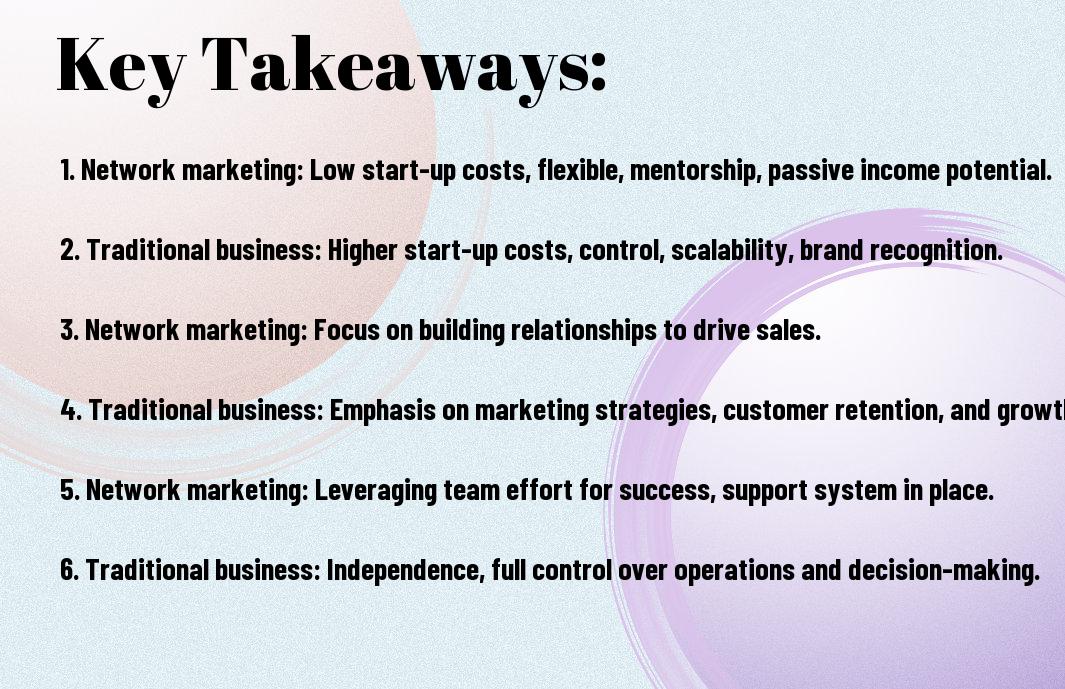Just like peeling back layers of a complex puzzle, Network Marketing and Traditional Business each offer unique pathways to success. In this comprehensive guide, we examine deep into the differences and similarities between these two business models. Unravel the enigma and discover which option aligns better with your entrepreneurial aspirations. For more in-depth analysis, check out MLM vs traditional marketing | Differences and similarities.

Key Takeaways:
- Cost: Network marketing usually involves lower start-up costs compared to traditional businesses, making it a more accessible option for individuals wanting to start their own ventures.
- Risk: While traditional businesses come with higher financial risks due to investments in inventory, employees, and infrastructure, network marketing typically carries less financial risk as distributors focus on selling products and building networks without the overhead costs.
- Profit Potential: Traditional businesses have higher profit potential in the long run as they scale, but network marketing offers the opportunity for passive income and leveraging a team to increase earnings by focusing on sales and team building.

Defining the Options
What is Network Marketing?
The concept of network marketing, also known as multi-level marketing (MLM), revolves around individuals selling products or services directly to consumers while also building a team of distributors. Network marketing offers individuals the opportunity to become entrepreneurs with minimal startup costs and the potential for high earnings. One of the key features of network marketing is the ability to earn commissions not only on one’s sales but also on the sales made by their recruited team members, creating a network or “downline”.
What is Traditional Business?
With traditional business, individuals establish a company or franchise, develop a product or service, and sell directly to consumers through storefronts, websites, or other channels. This model involves a more straightforward approach to business, where the focus is on creating a profitable enterprise through marketing, sales, and operations. Traditional businesses typically require significant upfront investments, market research, and operational planning to succeed.
Marketing plays a crucial role in traditional businesses, as companies must promote their products or services effectively to attract and retain customers. Establishing a brand, leveraging advertising strategies, and understanding consumer behavior are vital components for traditional businesses to thrive in competitive markets.
Business Structure
Even in the world of business, structure plays a crucial role in determining the success or failure of an organization. When comparing Network Marketing Versus Traditional Business Marketing, understanding the business structure is paramount.
Hierarchical Structure in Traditional Business
Businesses with a hierarchical structure, commonly found in traditional business models, follow a top-down approach where decision-making power and authority flow from the top management down to lower-level employees. This structure often leads to clear lines of command, with a CEO at the top, followed by managers, supervisors, and then employees. While this model can provide a sense of stability and clear direction, it can also stifle innovation and creativity, as ideas must pass through multiple levels of approval before implementation.
Decentralized Structure in Network Marketing
Decentralized structures are prevalent in network marketing organizations, where each individual acts as an independent business owner responsible for building their network and driving sales. This approach allows for more autonomy and flexibility, as distributors have the freedom to set their schedules and goals. However, with this independence comes the need for self-discipline and self-motivation to succeed in a competitive market.
Business
Businesses that adopt a decentralized structure in network marketing empower individuals to take charge of their success, offering them the opportunity to grow their business based on their efforts and skills. This model encourages entrepreneurship and can lead to significant financial rewards for those who excel in networking and selling products or services.

Financial Aspects
Keep Network Marketing vs Traditional Marketing in mind when considering the financial aspects of both business models. Initial Investment and Ongoing Costs play a significant role in determining the feasibility and sustainability of a business venture.
Initial Investment and Ongoing Costs
Aspects like the amount of capital needed to start and maintain a business differ greatly between traditional and network marketing. Traditional businesses often require a substantial initial investment for renting/buying physical space, inventory, and workforce, leading to higher upfront costs. On the other hand, network marketing typically involves lower initial investment and ongoing costs, as distributors usually pay for a starter kit and may have nominal monthly fees for membership and maintaining an online presence.
Earning Potential and Commission Structures
Any discussion on the financial aspects of network marketing vs. traditional business must include Earning Potential and Commission Structures. In network marketing, individuals have the opportunity to earn income not only from their sales but also from the sales of their downline. This multi-level commission structure can provide a lucrative income stream for those who excel at building a strong network. However, the hierarchical nature of commissions can sometimes lead to saturation within a market, affecting the earning potential for individuals further down the line.
This aspect underscores the importance of understanding the commission structures in network marketing. While the earning potential can be significant for successful network marketers, it’s important to be aware of the challenges that come with building and maintaining a solid downline to maximize earnings.
Time Commitment and Flexibility
Despite the allure of being your boss in both network marketing and traditional business, the time commitment and flexibility can vary significantly depending on the path you choose.
Traditional Business: Long Hours and Limited Freedom
One major characteristic of traditional business is the long hours required to establish and grow a successful venture. Entrepreneurs often find themselves working around the clock, especially in the initial stages of the business. This intense commitment can lead to limited personal time, strained relationships, and a constant struggle to find work-life balance.
Network Marketing: Flexibility and Autonomy
With network marketing, individuals can enjoy a more flexible schedule and greater autonomy over their time. Representatives can choose when and where to work, allowing them to design their work around their lifestyle rather than the other way around. This flexibility can be especially appealing to those with family obligations or other commitments outside of work.
It is necessary to note that while network marketing offers flexibility, it still requires dedication and effort to succeed. Representatives must be proactive in building their network, nurturing relationships, and continuously learning and growing their business.

Risk and Uncertainty
Market Risks in Traditional Business
One of the significant risks in a traditional business is the uncertainty of the market. External factors such as economic downturns, changing consumer preferences, and increased competition can make it challenging for businesses to predict future sales and profitability. These market risks can lead to fluctuations in revenue and potentially result in financial losses for the business.
Personal Risks in Network Marketing
Risks in network marketing are often more personal in nature. Individuals involved in network marketing take on the risk of investing time and effort into building their business without a guaranteed return. While the potential for high rewards exists, there is also the possibility of failure. Network marketers also face the challenge of navigating a saturated market and convincing others to join their network.
Risks in network marketing can be high due to the reliance on recruitment and the uncertainty of sustaining a successful downline. It requires individuals to have strong interpersonal skills, resilience, and a willingness to take risks in order to succeed in this business model.
Support Systems and Training
Your business success often hinges on the support and training you receive. Let’s explore how both Network Marketing and Traditional Business fare in this crucial aspect.
Formal Education and Mentorship in Traditional Business
Training in traditional businesses typically involves formal education, industry certifications, and on-the-job learning opportunities. Many successful business leaders attribute their accomplishments to the mentorship they received along the way. Mentors can offer invaluable guidance, share experiences, and help navigate challenges, paving the way for long-term success.
Ongoing Support and Community in Network Marketing
Community plays a vital role in Network Marketing success. Companies often provide extensive training programs, workshops, and conferences to help distributors hone their skills. The community aspect creates a support system where members can learn from each other, share best practices, and motivate one another. This collaborative environment fosters growth and cultivates a sense of belonging.
Support in Network Marketing goes beyond traditional business models. Distributors often have access to regular coaching sessions, online forums, and networking events. This consistent support system keeps individuals motivated, engaged, and equipped with the tools they need to succeed in this dynamic industry.
Summing up
On the whole, both network marketing and traditional business models have their unique advantages and challenges. Network marketing offers the opportunity for low start-up costs, flexibility, and the chance to build a business with the support of a community. In contrast, traditional businesses provide more control over the product or service, long-term stability, and potential for exponential growth.
Ultimately, the choice between network marketing and traditional business depends on individual goals, preferences, and risk tolerance. Both paths require hard work, dedication, and strategic planning to succeed. Whichever option you choose, embracing innovation, adapting to market changes, and cultivating strong relationships will be key to thriving in the ever-evolving world of business.
FAQ
Q: What is Network Marketing?
A: Network Marketing, also known as Multi-Level Marketing (MLM), is a business model where independent representatives sell products or services directly to consumers and earn commissions on their sales and the sales of their downline.
Q: What is Traditional Business?
A: Traditional Business refers to a business model where a company sells products or services through physical locations, such as stores or offices, and may involve hiring employees, managing inventory, and overseeing all aspects of the business.
Q: What are the key differences between Network Marketing and Traditional Business?
A: The main differences lie in the business model – Network Marketing relies on a network of independent representatives to sell products, while Traditional Business operates through physical locations and employees.
Q: Which option provides more flexibility – Network Marketing or Traditional Business?
A: Network Marketing typically offers more flexibility as representatives can work from anywhere and choose their own hours, while Traditional Business owners may be tied to physical locations and set working hours.
Q: In terms of earning potential, which option is better – Network Marketing or Traditional Business?
A: Earning potential can vary in both Network Marketing and Traditional Business. Network Marketing offers the opportunity for passive income through building a team, while Traditional Business owners may see higher profits but also carry more financial risk.



